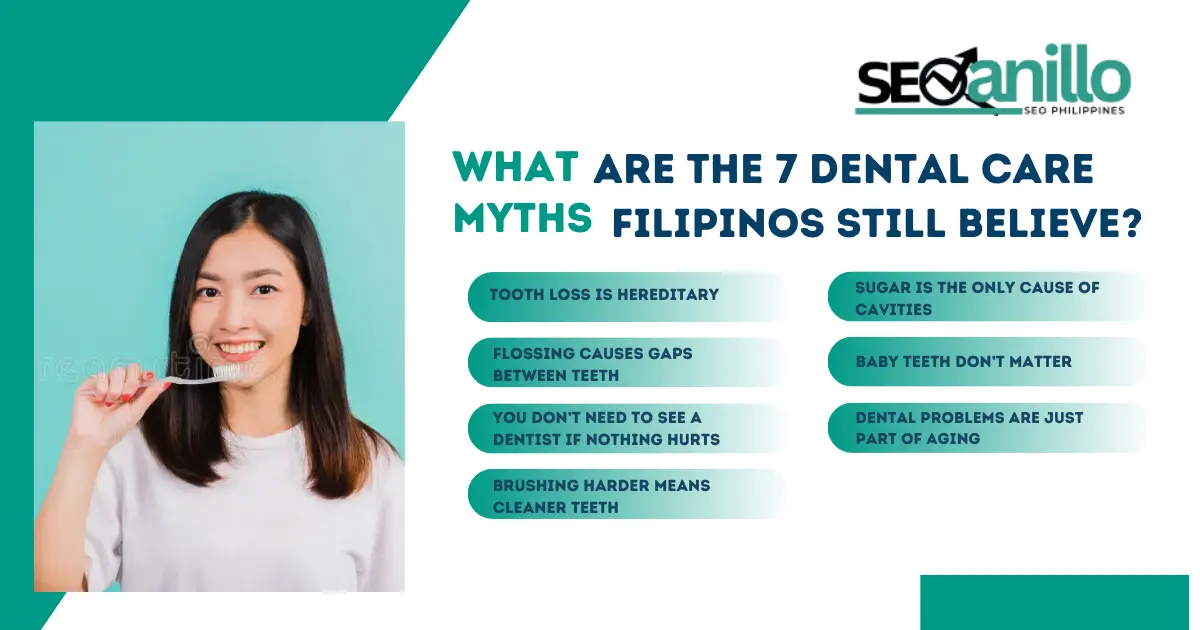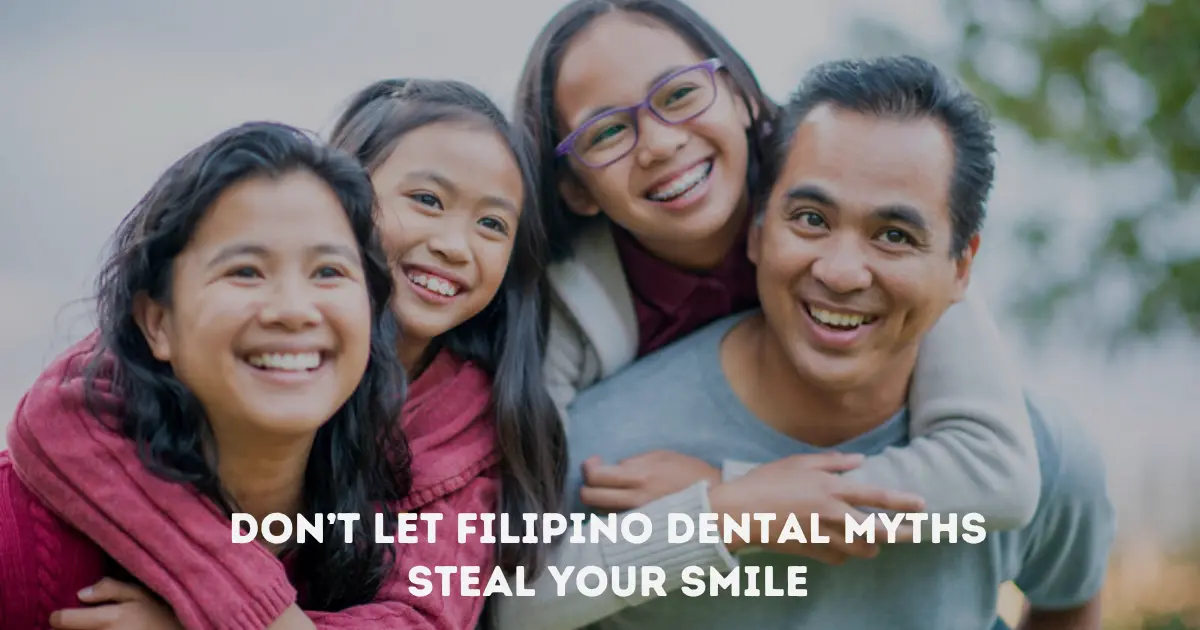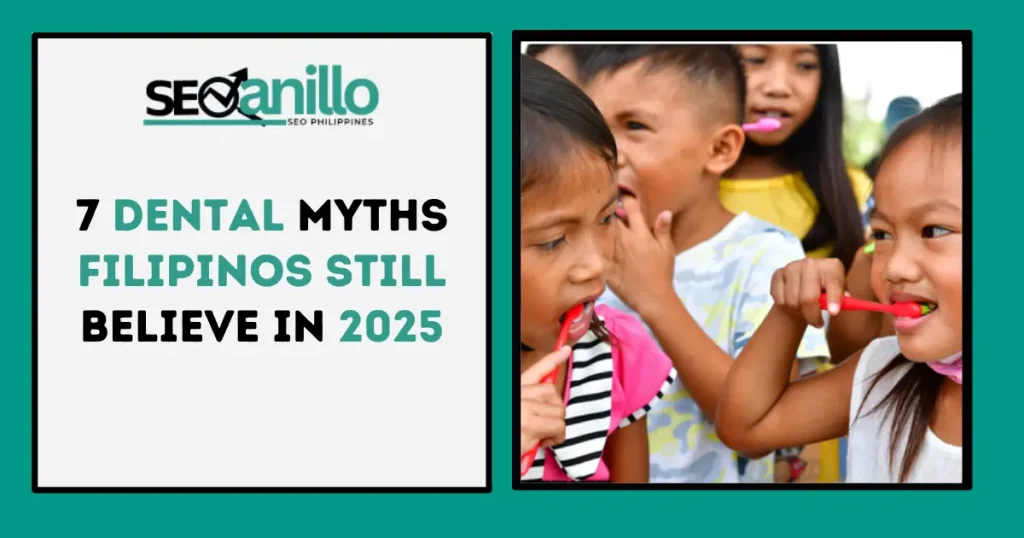Dental myths have deep roots in Filipino culture. From using charcoal to whiten teeth to skipping the dentist unless having unbearable pain. Passed down from my grandparents to other relatives or whispered in a neighborhood, these beliefs may have started with good intentions, but they’re not always good for your teeth.
Giving you my personal experience of 7 dental care myths that many Filipinos still believe today. Some might surprise you, others might sound all too familiar but all of them could be standing between you and a truly healthy smile.
What are the 7 Dental Care Myths Filipinos Still Believe?

1. Tooth loss is hereditary
Many Filipinos believe in dental myths that losing teeth is simply genetic and inevitable. In 2024, Philippine Dental Association reported that 72% of Filipinos have dental caries or tooth decay. While genetics may play a minor role, the real cause of tooth loss is usually poor oral hygiene, gum disease, and cavities not your family tree.
The Truth: Healthy habits not heredity determine the strength and longevity of your teeth. Regular brushing, flossing, and professional dental cleanings can greatly reduce the risk of tooth loss. Don’t blame your grandparents’ bad habits. You can absolutely keep your natural teeth for life with proper brushing, flossing, and regular dental visits.
2.Flossing causes gaps between teeth
Some people avoid flossing because they believe in one of the common dental myths that it will create spaces between their teeth. However, flossing actually removes plaque and food debris, which prevents gum disease and tooth decay.
The Truth: Gaps actually form when gums recede due to bacteria, not because of flossing. Bleeding gums during flossing usually mean there’s existing inflammation. According to the National Institutes of Health, short-term controlled studies show that flossing combined with brushing reduces gingivitis more effectively than brushing alone which means consistent flossing actually helps heal your gums instead of harming them.
3. You don’t need to see a dentist If nothing hurts
Fifty percent of Filipinos visit a dentist only when they experience oral health problems and its common dental myths that are rooted in Filipino culture: “Nothing hurts, so why do you need to see a dentist?”.Unfortunately, waiting for pain usually means the problem is already severe.
The Truth: Preventive care is always cheaper and less painful than treatment. Regular cleanings and check-ups can catch cavities, infections, and gum issues early.
4. Brushing harder means cleaner teeth
One common dental myth is that brushing hard or more frequently will make teeth whiter and cleaner. In reality, this can actually damage your enamel and hurt your gum. So, using a soft-bristled toothbrush and gentle circular motions becomes an effective and safe way to clean your teeth.
The Truth: Overbrushing can lead to sensitivity, gum recession, and even an increased risk of decay. Recent dental health studies reported in the National Institutes of Health found increasing the force didn’t improve plaque removal. Instead, stronger brushing causes more abrasion and gum recession.
5. Sugar is the only cause of cavities
Many believe that avoiding sweets alone will protect their teeth. But even “natural” or sugar-free foods and drinks can still cause cavities, especially starchy or acidic ones like bread, rice, or soda.
The Truth: Cavities are caused by bacteria in your mouth feeding on carbohydrates and sugar, producing acid that weakens your enamel. Recent studies showed that starch can also cause tooth cavities. So, it’s not just sweets, you primarily need good oral hygiene habits.
6. Baby teeth don’t matter
According to the World Health Organization (WHO), 510 million children worldwide have cavities in their baby teeth. Yet, many parents ignore dental problems in baby teeth, thinking they’re temporary.
The Truth: Early dental care is crucial. Neglected baby teeth can affect the development of adult teeth, cause infections, and lead to long-term oral health problems. So, start cleaning your baby’s mouth even before teeth erupt and bring them to a dentist as soon as their first tooth appears.
7. Dental problems are just part of aging.
Many Filipinos follow the dental myth that losing teeth and having dental problems are unavoidable parts of getting older. While 60% of older adults worldwide experience dental caries showing that age does really have an effect that makes gums and teeth more vulnerable, tooth loss is still not a natural or inevitable result of aging.
With proper oral hygiene, regular dental visits, and a healthy diet, seniors can keep their natural teeth for life.
The Truth: Dental problems are preventable at any age. Good dental care has no age limit,never too late to maintain a healthy smile. Age is not the main reason people experience dental issues, poor oral hygiene and lack of preventive care are.
Don’t Let Filipino Dental Myths Steal Your Smile

When it comes to your oral health, believing in dental myths can do more harm than good. From skipping dentist visits to relying on outdated beliefs, these misconceptions can put your teeth, gums, and overall confidence at risk.
Invest in your oral health, don’t let myths hold you back, keep your smile shining and bright.
Want similar contents like these in your Dental Clinic Website? SamSEOPhilippines helps you increase your clinic’s appointments through proven SEO strategies like blog posting and service page optimization. Contact us today for a free consultation.
Filipino Dental Care Myths Frequently Asked Questions
Is brushing once a day enough?
Can unhealthy teeth be inherited?
Do full denture wearers need dentist visits?
Should I brush hard for cleaner teeth?
Is extraction always the cure for toothache?
Can calamansi or charcoal whiten teeth?
Not brushing daily causes mouth sores?
Is tooth extraction safe during period or after birth?
Can perfume stop tooth pain?

